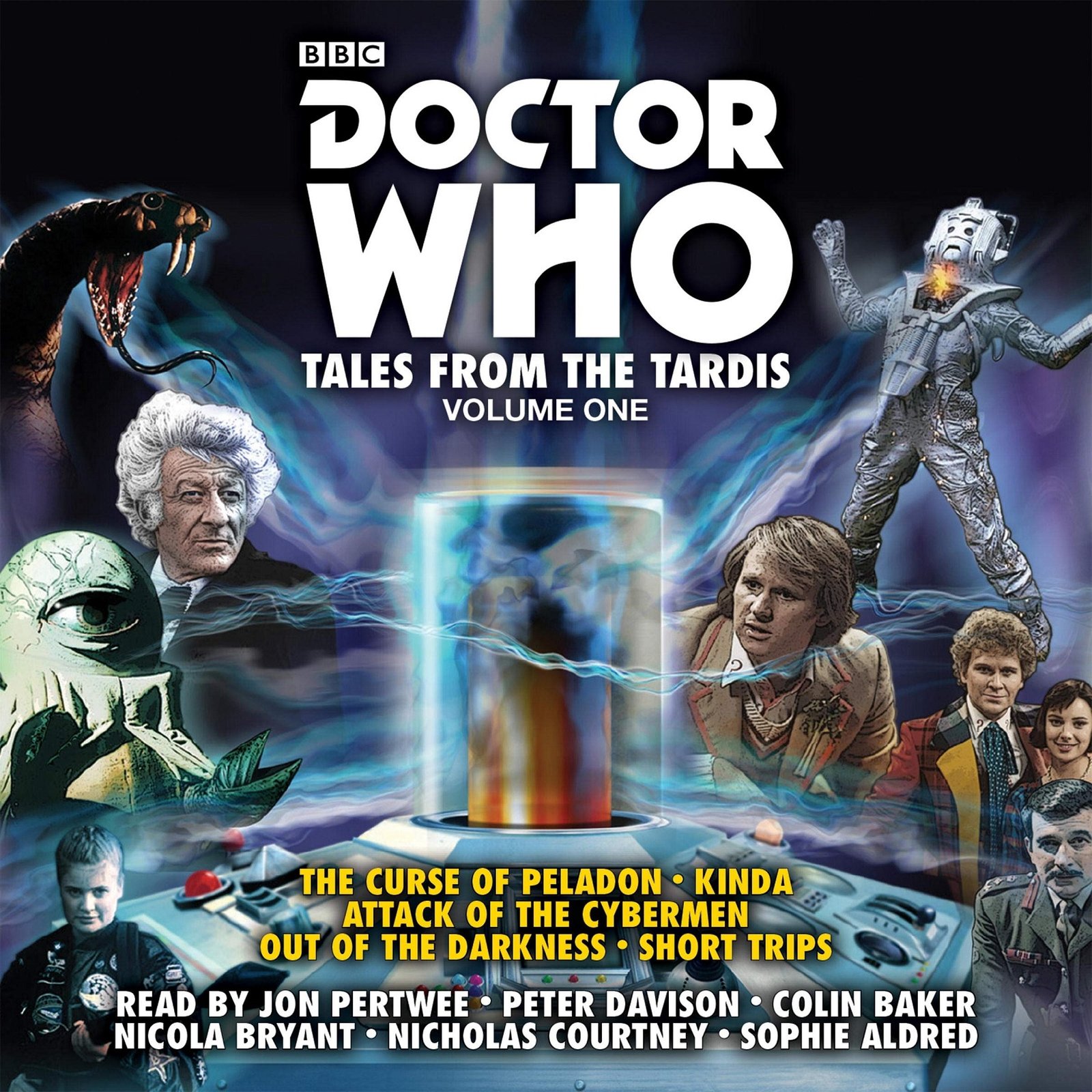This all seems like a very long time ago now, but every January, I churn the loft. For those who don’t know, ‘churning’ refers to the act of sorting out your stuff, but instead of throwing stuff out (or better, taking that stuff to the local charity shop) you just move things from one place to another. It’s usually sparked by putting the Christmas decorations away and noticing all the mess from throughout the year: the displaced suitcases, empty cardboard boxes (just in case the item they contained broke down), and general put-it-up-there-out-of-the-way clutter.
In among the storage there are the boxes with my Doctor Who things: my Target books, BBC Books, VHS covers, and a few vintage toys. But every year I always find something that I had forgotten about. This year, it was a copy of the CD-ROM of the tele-snaps re-construction of The Power of the Daleks and the audiobook of Doctor Who and the Daleks read by William Russell.
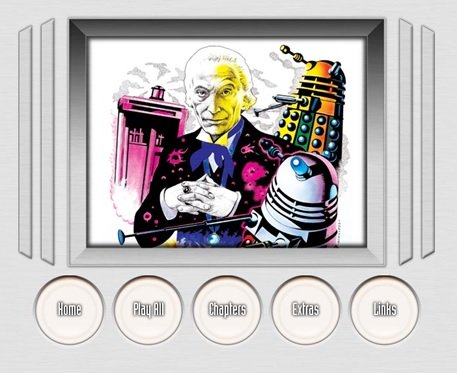
These were both part of a short-lived range of CD-ROMs/MP3-CDs.
Released from 2003 to 2005, seven Doctor Who sets were issued; five of the seven were audio and in MP3 format. The other two were audio/visual.
The range was predominantly Doctor Who, but Fawlty Towers (audio only), Dead Ringers, The Hobbit, and the radio version of The Hitch Hiker’s Guide to the Galaxy initially joined in.
In the first few years of the new millennium, it made a lot of sense to try and cash in on the boom in home computers and exploit emerging newer audio types. The then-popular audio compression codec MP3 was used which allowed, according to the CDs’ sleeve notes, 25 hours of audio to fit onto one CD.
However, this information is contradicted on the BBC Press Office release, where it claims that it’s 15 hours. Nevertheless, the initial draw was for fewer discs per release at a “comparably lower cost to a standard CD”.
Today, despite newer codecs being more efficient at audio compression like AAC, MP3 still remains popular; for example, Big Finish still offer MP3 as a download option.
The Releases
The Daleks Master Plan (2003)
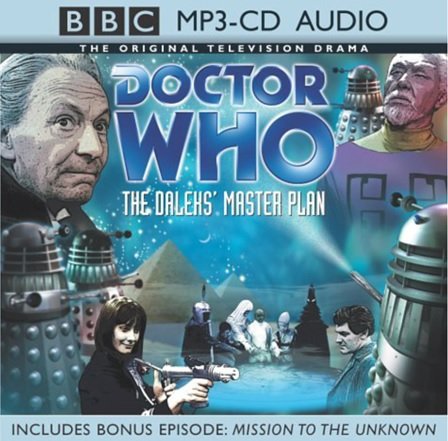
Where the original release was a five-disc bundle, The Daleks’ Master Plan was a single CD with a running time of five hours and 20 minutes and, as the cover states, includes Mission to the Unknown.
This is a tad hard to get hold of without laying out silly money on auction sites and as a result, I haven’t yet been able to add this to my collection.
The Abominable Snowman/The Web of Fear (2003)
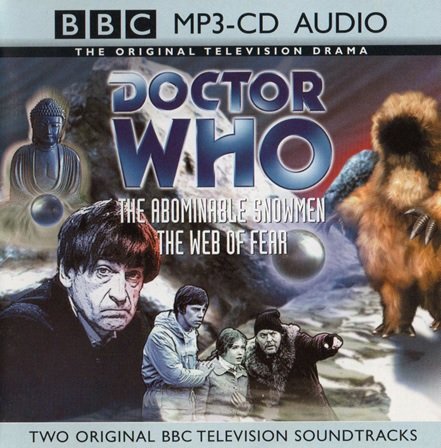
This was a two-disc release featuring one story per disc; a Great Intelligence boxset as it were.
The total runtime of each disc is four hours and 20 minutes and when looking at the data side of the CDs, it is clear that only about a third of the disc contains any data. This makes it very obvious that both stories could have easily fitted onto one disc. At a potential of 25/15 hours (delete as applicable) per CD, small boxsets of entire season soundtracks were entirely possible.
You may notice that the cover exclusively features The Abominable Snowman; not to worry, dear collector, each disc has the artwork lifted from the conventional CD release printed on it, and a clean version (i.e. no lettering or logo) of The Web of Fear cover bags the inside, behind the CD tray.
Tales of the TARDIS Vol. 1 (2004)
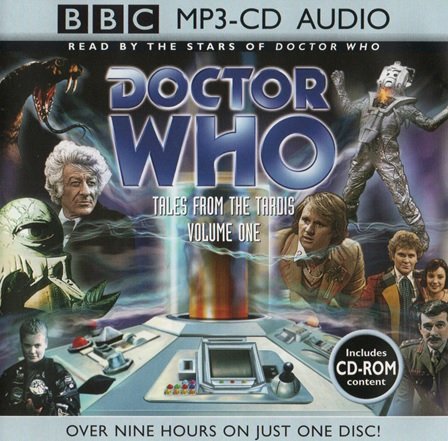
This was a compilation of previously released material, mostly on cassette tape (Out of Darkness had a CD release), but with a very generous running time of nine and a half hours! And for our entry price (£25, if memory serves me right), we got the following:
- The Curse of Peladon read by Jon Pertwee
- Kinda read by Peter Davison
- Attack of the Cybermen read by Colin Baker
- Out of the Darkness, three stories read by Colin Baker and Nicola Bryant
- Short Trips: six stories read by Nicholas Courtney and Sophie Aldred
Just to note, that Curse, Kinda, and Attack are not the full Target audiobooks (that would have been incredibly impressive for a single disc), but abridged versions.
The CD_ROM content amounts to “a special TARDIS-themed viewer screen, images from the original series, excerpts from other Doctor Who CD releases, web-links, and additional features.” Obviously, after 16 years, the web-links are a bit out of date.
Tales of the TARDIS Vol. 2 (2004)

As with volume one, all of the contents of volume two had been previously released, but this had a slightly longer running time of 10 hours. Volume two presented:

- Planet of the Daleks read by Jon Pertwee
- Warriors of the Deep read by Peter Davison
- Vengeance on Varos read by Colin Baker
- The Novel of the Film (sic) read by Paul McGann
- Earth and Beyond: three stories read by Paul McGann
Again, Planet, Warriors, Vengeance, and The Novel are abridged versions.
The CD-ROM content was pretty much as volume one, but I have to admit that I had a bit of a hard time trying to get access to the CD-ROM content on the discs; my Mac just refused to even acknowledge them and my Windows laptop would let me access the files, but not run the disc properly. I could have pursued it more, but I present the gist from the screengrabs I was able to take.
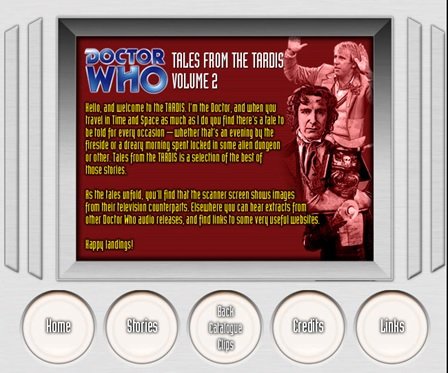
Both of the Tales of the Tardis volumes were re-released on conventional CD box-sets in 2016/17. The number of CDs per box was eleven for volume one and twelve for volume two. That was some serious compression going on for the MP3s! The same artwork, minus the MP3-CD AUDIO banner, was used for the covers.
Doctor Who and the Daleks (2005)
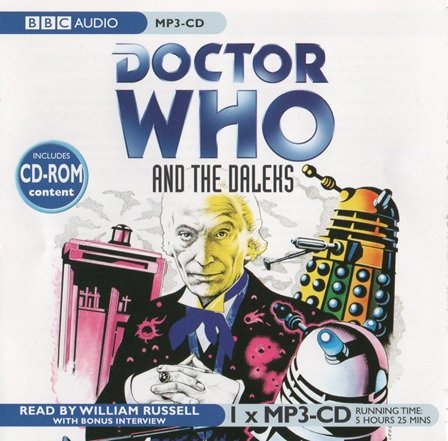
The only audiobook in the range was David Whittaker’s original novel, read by William Russell, and compressing the conventional CD release’s five discs.
What was unusual about this release is that it can be easily mistaken for the conventional release. All the others, although having the same artwork as their CD counterparts, have MP3 AUDIO very prominently on the cover. With Daleks, the only area it’s flagged is where it states the number of CDs at the bottom right-hand corner. However, the physical box size would have been a bit of a giveaway.
The CD-ROM content is small. Effectively, there were a few screen-shots from the TV serial and a gallery of the pen-line drawings from the original book release.

On a personal note, I’ve got a very soft spot for this audiobook. It was one that BBC4 Extra transmitted as part of the 50th anniversary celebrations and which accompanied me on my two and a half mile walk home from the office where I worked at that time. Nicholas Briggs may not appear as the voice of the Daleks, but he did introduce this audiobook on BBC4 Extra.
It’s worth a mention that the conventional CD version was also released in the same year.
I am quite surprised that Doctor Who and the Daleks was the only Target novelization released. Audiobooks were perfect for presentation on MP3-CD as spoken word doesn’t require the same levels of bitrate as for music. After all, the BBC’s short-lived range did get ambitious when it later released Tolstoy’s War and Peace!
Death Comes to Time (2004)
The remaining two releases, although not in chronological order from the above, featured visual content as well as audio and were designed to play on a PC.
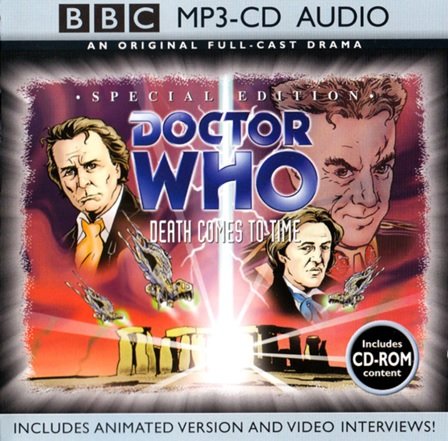
Death Comes to Time was quite a luxurious release as it also featured… well… let the back-cover’s blurb explain:
“This Special Edition combines MP3-CD and CD-ROM elements to include, for the first time, the original BBCi webcast animation Death Comes to Time plus the award-winning remastered CD version, cast video interviews, outtakes, spoofs, online character biographies, full colour illustrations and initial artwork ‘roughs’, a TARDIS-themed web viewer, and excerpts from other Doctor Who CDs.”
That’s practically a DVD’s worth of content, but this is another release that is hard to buy at a reasonable price and another I don’t own as a result.
Oddly, this was still advertised on the cover as a MP3-CD, with a small insert saying that it ‘includes’ CD-ROM content. I would argue that the CD-ROM content – the BBCi webcast – would be the main draw. Was Death Comes to Time animated enough for a DVD release? It would appear not; Scream of the Shalka was the only BBCi content to warrant its own DVD.
Sadly, most of the BBCi output didn’t get prominent releases: the visual version of McGann’s Shada was only an extra on the 2013 Shada reconstruction DVD (accessed by computer only) or the more recent Shada Blu-ray steelbook; Real Time remains an audio-only on Big Finish; and BBCi’s non-Doctor Who webcast, Ghost of Albion, is gone and forgotten (although it is still up on the abandoned BBC cult website, as are all the others).
Doctor Who Reconstructed: The Power of the Daleks (2005)
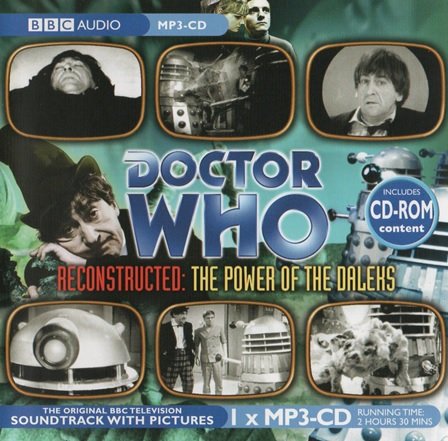
To the prospective purchaser, there was no doubt that this The Power of the Daleks release was different from the conventional soundtrack CD; the artwork differs and it states that this is “reconstructed” and a “soundtrack with pictures”.
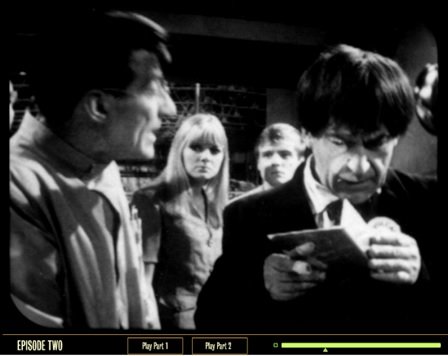
Interestingly, the blurb on the back seems to indicate that this was intended as the first of a series of reconstructions:
“In Doctor Who Reconstructed, the narrated soundtrack of a ‘missing’ Doctor Who serial is matched with a slideshow of rare off-screen stills, taken by the photographer John Cura. Together these elements make the closest possible simulation of the actual film recording.” That statement does appear to indicate that this was the beginning of a range of ‘Doctor Who Reconstructed’.
As it says on the tin – or rather, the back cover – to be able to watch the reconstruction, a PC was needed
Why Was This Range So Short Lived?
As I’m unable to find any specific reason why the MP3-CDs didn’t take off, I can only surmise as to the reasons that this range was so limited.
Audiobooks and Soundtracks:
Battling Established Releases
If a collector is buying the conventional CDs (and is still doing so to this day), an MP3-CD doesn’t really offer any benefit other than a tiny bit of extra shelf space. It is essentially the same format (CD), just in a different playback method.
Is there really any attraction to re-buying what is effectively the exact same release again?
Digital Downloads
Downloads were on the horizon as digital download media on iTunes was launched around the same time as this range began. But although it was a while before Doctor Who content was available, it was conceivable that many of the computer buffs would have expected them at any time.
MP3-CDs fall down a hole somewhere in the middle of the physical/download divide; it’s a physical media, but in download quality.
Sound Quality
As was discussed in one of my previous articles, audiophiles want the superior sound quality of a CD. Arguably, the MP3-CD’s compressed downloads have to sacrifice quality for high-storage (that is to say, fitting as much as possible onto one disc) which doesn’t sit well with many.
It probably doesn’t matter that much for the spoken-word only releases, but where the 1960s soundtracks are not hi-fi, as good as they are, any compromise in presentation can be detrimental.
CD Players Around the Turn of the Millennium
The sleeve notes warn the prospective buyer that up to date CD or DVD player will be required, but many people, like myself, may not have had recently-released playback equipment, around the time of the launch of these discs, as our tech used to last a bit longer.
My CD player was a 1993 Technics SL-PG420A and it was superb. It only played conventional CDs but I had no reason to replace it. In fact, I haven’t; it’s still going strong.
Therefore, would there be any benefit to buying up to date players just for this range when the user was quite likely collecting the conventional CD versions anyway?
Audiobooks, Soundtracks, and CD-ROMs:
The Early 2000’s Home Computer Boom
Ah, but what about PCs? Yes, this was the best and a very good argument for the MP3-CDs/CD-ROMs – to take advantage in the uptake in home computers, which started the MP3 craze in the first place. In theory, it’s a brilliant idea; a set of Doctor Who themed CDs with picture content as well as audio that can be accessed on your home computer.
In practice, not so much: PCs could still play conventional CDs and a user could rip them to MP3 themselves at whatever bit-rate they wanted, plus the telesnaps and BBCi (i.e. visual) content were available on the then BBC Doctor Who website to view for free.
Nice Try (The Obligatory Opinion Piece)
The problem is that the MP3-CDs/CD-ROMs ultimately had nothing new to offer. Indeed, the press release states that the initial MP3-CDs were best-selling titles. Best-selling does tend to indicate titles that consumers already had!
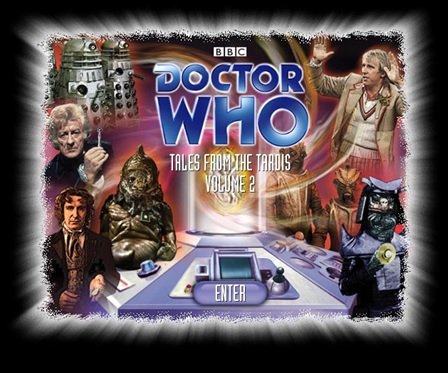
There may have been some monetary benefit – the Yeti set is a two-for-one – but all the constituent parts had been released before or were available elsewhere. All the lovely shiny new visual content was being made for the DVDs, which left nothing for these and the prices were not too far behind the DVDs themselves.
It’s worth a mention that, although not a consideration at their release, 10 years down the line, the rise in tablets and cheaper laptops/netbooks meant that the humble CD-ROM is practically no more; CD/DVD drives are no longer a feature of most hardware.
The bottom line is that these couldn’t have sold well, otherwise they would have continued. But nevertheless, these are still interesting; a little oddity that tried to cash in on the times.
Oh, by the way, actually about 10 boxes went to the charity shop this year.
